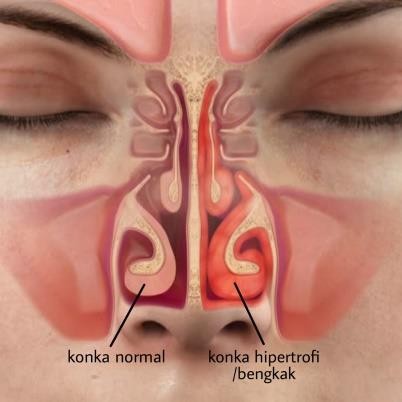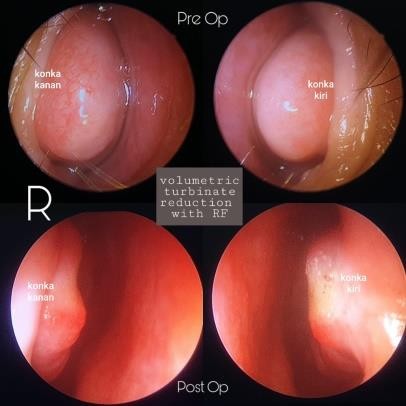
A stuffy nose is often overlooked, yet it can disrupt daily activities and rest. Common causes are inflammation caused by allergies or polluted air. When irritated, the nasal passages produce excess mucus to protect themselves. Unfortunately, this mucus actually causes congestion and makes it difficult to breathe. So, what are the main causes of a stuffy nose, and how can you quickly resolve it?
Various Conditions That Can Cause Nasal Congestion
A stuffy nose may seem minor, but it can be quite disruptive to your daily routine. This condition can be caused by many factors, including:
1. Cough and Cold
Coughs and colds are usually caused by mild upper respiratory infections, such as rhinovirus. One symptom is nasal congestion, which can make it difficult to breathe.
This condition usually resolves on its own within 7–10 days, but it can take longer for smokers. Although similar, a cold is different from the flu. The flu is caused by the influenza virus and its symptoms tend to be more severe than the common cold, often referred to as the "common cold."
2. Flu
Flu, or influenza, is a viral infection that attacks the respiratory tract and can cause nasal congestion due to inflammation of the mucous membranes. Other symptoms include fever, muscle aches, headache, cough, and chills.
3. Allergies
A stuffy nose isn't always caused by a cold, but can also be caused by an allergic reaction. When the body is exposed to allergens such as dust, pollen, animal dander, cold air, or certain foods, the immune system releases histamine, which triggers inflammation in the nasal passages.
As a result, symptoms such as a stuffy nose, sneezing, itchy or watery eyes, a sore throat, and coughing appear.
4. Sinusitis
Sinusitis is an inflammation of the sinus cavities that typically occurs after a cough or cold. This condition causes the tissues in the nose to swell and increases mucus production, narrowing the airways. This condition is commonly accompanied by symptoms of nasal congestion, headache, facial pain, and coughing.
5. Nasal Polyps
Polyps are a type of airway obstruction caused by soft tissue growths in the nasal passages. Initially, they often cause no symptoms, but as they grow larger, they can cause nasal congestion, respiratory problems, and even a decreased sense of smell, especially in people with asthma or chronic allergies.
6. Swelling of the Nasal Conchae
One common cause of nasal congestion is swelling of the nasal conchae, the mucous membrane lining the nasal cavity that surrounds the thin bones. When swollen, the conchae can narrow the airways and make breathing difficult.

Complaints due to swelling of the nasal conchae:
- Shortness of breath, frequent colds, and sneezing
- Itchy nose, pain at the bridge of the nose, and snoring
- Risk of sinusitis, nosebleeds, and sleep apnea
- Emotional disorders such as stress or depression
Causes of nasal concha swelling:
- Allergies and sinusitis
- Irritation from pollution or chemicals
- High stomach acid and consumption of certain medications
- Cold weather, body position, and psychological factors
Tips for Handling a Blocked Nose
Here are some methods that can be applied to relieve nasal congestion according to the condition:
1. Take antihistamines
Antihistamines or anti-allergy medications can help relieve nasal congestion, runny nose, and sneezing, but can cause side effects such as drowsiness and dry mouth.
2. Use a Saline Spray or Decongestant
Saline sprays help keep the nose moist and reduce mucus congestion. To relieve swelling more quickly, topical decongestants such as oxymetazoline can be used. Although available over-the-counter, it's important to follow the instructions to avoid a rebound effect.
3. RF (Radifrequency) Action
To reduce the size of the nasal conchae, another alternative can be chosen in the form of a minimally invasive endoscopic surgical procedure to reduce the size of the conchae more permanently using a Radiofrequency (RF) device.

The RF procedure is minimally invasive, requires no incisions, minimal bleeding, does not require nasal packing, and has a high success rate of over 85%. This therapy also reduces patients' dependence on long-term oral medications.
See an ENT-KL Doctor for the Right Solution for Nasal Congestion
It is important for anyone experiencing nasal congestion, especially if the complaint persists for a long time or recurs frequently, not to delay seeing an ENT-KL specialist.
With a thorough evaluation, your doctor can determine the exact cause of your nasal congestion and recommend the most appropriate treatment, ranging from simple medications to more advanced medical procedures.
Proper treatment will help improve quality of life and prevent complications that may arise from untreated nasal obstruction.
Article written by Dr. Edo Wira Candra, Sp.THTKL, M.Kes., FICS (Specialist in Ear, Nose, Throat & Head-Neck Surgery, EMC Sentul Hospital).
